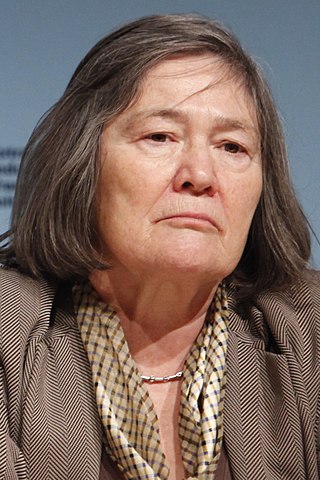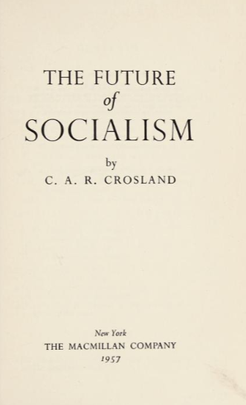
Clare Short is a British politician who served as Secretary of State for International Development from 1997 to 2003.

New Labour is the political philosophy that dominated the history of the British Labour Party from the mid- to late 1990s until 2010 under the leadership of Tony Blair and Gordon Brown. The term originated in a conference slogan first used by the party in 1994, later seen in a draft manifesto which was published in 1996 and titled New Labour, New Life for Britain. It was presented as the brand of a newly reformed party that had altered the old Clause IV and instead endorsed market economics. The branding was extensively used while the party was in government between 1997 and 2010. New Labour was influenced by the political thinking of Anthony Crosland and the leadership of Blair and Brown as well as Peter Mandelson and Alastair Campbell's media campaigning. The political philosophy of New Labour was influenced by the party's development of Anthony Giddens' Third Way which attempted to provide a synthesis between capitalism and socialism. The party emphasised the importance of social justice, rather than equality, emphasising the need for equal opportunity and believed in the use of markets to deliver economic efficiency and social justice.
The Third Way, also known as Modernised Social Democracy, is a predominantly centrist political position that attempts to reconcile centre-right and centre-left politics by synthesising a combination of economically liberal and social democratic economic policies along with centre-left social policies.

In British politics, Blairism is the political ideology of Tony Blair, the former leader of the Labour Party and Prime Minister between 1997 and 2007, and those that support him, known as Blairites. It entered the New Penguin English Dictionary in 2000. Elements of the ideology include investment in public services, expansionary efforts in education to encourage social mobility, and increased actions in terms of mass surveillance alongside a ramping up of law enforcement powers, both of these latter changes advocated in the context of fighting organized crime and terrorism. Blairites have additionally been known for their contrast with the traditional support for socialism by those believing in left-wing politics, with Blair himself and others speaking out against the nationalisation of major industries and against also heavy regulations of business operations. On foreign policy, Blairism is supportive of close relations with the United States and liberal interventionism, including advocacy for both the Iraq war and the War in Afghanistan (2001–2021).

The New Statesman is a British political and cultural news magazine published in London. Founded as a weekly review of politics and literature on 12 April 1913, it was at first connected with Sidney and Beatrice Webb and other leading members of the socialist Fabian Society, such as George Bernard Shaw, who was a founding director. The longest-serving editor was Kingsley Martin (1930–1960), and the current editor is Jason Cowley, who assumed the post in 2008.
Clause IV is part of the Labour Party Rule Book which sets out the aims and values of the British Labour Party. The original clause, adopted in 1918, called for common ownership of industry, and proved controversial in later years; Hugh Gaitskell attempted to remove the clause following Labour's loss in the 1959 general election.

Sir Anthony Charles Lynton Blair is a British politician who served as Prime Minister of the United Kingdom from 1997 to 2007 and Leader of the Labour Party from 1994 to 2007. He was Leader of the Opposition from 1994 to 1997 and held various shadow cabinet posts from 1987 to 1994. Blair was Member of Parliament (MP) for Sedgefield from 1983 to 2007, and was special envoy of the Quartet on the Middle East from 2007 to 2015. He is the second-longest-serving prime minister in post-war British history after Margaret Thatcher, the longest-serving Labour politician to have held the office, and the first and only person to date to lead the party to three consecutive general election victories.
David Ian MarquandFLSW was a British academic and Labour Party Member of Parliament (MP).

The Abolition of Britain: From Lady Chatterley to Tony Blair is the first book by British conservative journalist Peter Hitchens, published in 1999. It examines a period of perceived moral and cultural reform between the 1960s and New Labour's 1997 general election win. Hitchens asserts that the reforms facilitated vast and radical constitutional change under Tony Blair's new government that amounted to a "slow motion coup d'état". The book was cited by Gillian Bowditch in The Times as being a major modern work to dissect "the decline in British morals and manners over the past 50 years", and identified by Andrew Marr in The Observer as "the most sustained, internally logical and powerful attack on Tony Blair and all his works".

The Future of Socialism is a 1956 book by Anthony Crosland. It was one of the most influential books in post-war British Labour Party thinking. It was the seminal work of the 'revisionist' school of Labour politics.

Andrew Adonis, Baron Adonis, is a British Labour Party politician and journalist who served in HM Government for five years in the Blair ministry and the Brown ministry.
The British left can refer to multiple concepts. It is sometimes used as shorthand for groups aligned with the Labour Party. It can also refer to other individuals, groups and political parties that have sought egalitarian changes in the economic, political, and cultural institutions of the United Kingdom. There are various sub-groups, split between reformist and revolutionary viewpoints. Progressives and social democrats believe that equality can be accommodated into existing capitalist structures, but they differ in their criticism of capitalism and on the extent of reform and the welfare state. Anarchists, communists, and socialists, among others on the far left, on the other hand argue for abolition of the capitalist system.
Lance Price is Chief of Staff to Kim Leadbeater, MP for Batley and Spen in the UK. He returned to active politics to help run her by-election campaign, having worked with her at the Jo Cox Foundation since the murder of her sister, who was MP for the constituency from 2015 to 2016. He is also a writer, broadcaster and political commentator. He was a journalist for the BBC from 1981 to 1998, then became special adviser to Prime Minister Tony Blair, eventually assuming the role of Director of Communications for the Labour Party, coordinating the Labour Party election campaign of 2001. He has published five books, and appears regularly on Sky News and the BBC. Price's fourth book, The Modi Effect, which details the rise of the Indian Prime Minister Narendra Modi, was published by Hodder & Stoughton in 2015.
Social democracy is a political, social, and economic philosophy within socialism that supports political and economic democracy and a gradualist, reformist and democratic approach towards achieving socialism. In modern practice, social democracy has become mainly capitalist, with the state regulating the economy in the form of welfare capitalism, economic interventionism, partial public ownership, a robust welfare state, policies promoting social equality, and a more equitable distribution of income.
The Labour Party is a social democratic political party in the United Kingdom that sits on the centre-left of the political spectrum. In a broader sense, the party has been described as an alliance of social democrats, democratic socialists and trade unionists. It is the governing party of the United Kingdom, having won the 2024 general election, and is currently the largest political party by number of votes cast and number of seats in the House of Commons. There have been seven Labour prime ministers and fourteen Labour ministries. The party traditionally holds the annual Labour Party Conference during party conference season, at which senior Labour figures promote party policy.

The Fabian Society is a British socialist organisation whose purpose is to advance the principles of social democracy and democratic socialism via gradualist and reformist effort in democracies, rather than by revolutionary overthrow. The Fabian Society was also historically related to some of the furthest left factions of radicalism, a left-wing liberal tradition.

Blue Labour is a British campaign group and political faction that seeks to promote blue-collar and culturally conservative values within the British Labour Party – particularly on immigration, crime, and community spirit – while remaining committed to labour rights and left-wing economic policies. It seeks to represent a traditional working-class approach to Labour politics.

Socialism in the United Kingdom is thought to stretch back to the 19th century from roots arising in the English Civil War. Notions of socialism in Great Britain have taken many different forms from the utopian philanthropism of Robert Owen through to the reformist electoral project enshrined in the Labour Party that was founded in 1900 and nationalised a fifth of the British economy in the late 1940s.

The Starmer Project: A Journey to the Right is a 2022 book by British journalist Oliver Eagleton, published by Verso Books. It is a political biography of British Labour Party leader Keir Starmer, and follows his time in the Crown Prosecution Service and Shadow Cabinet of Jeremy Corbyn, his predecessor, covering his political alliances, his victory in the 2020 Labour Party leadership election, and subsequent leadership of the Labour Party.
Conor Ryan is an Irish-born UK-based independent writer and consultant, a former senior civil servant, and adviser who was until June 2023 the Director of External Relations at the Office for Students, a non-departmental public body of the British Department for Education. He served as a special adviser and the senior education adviser to British Secretary of State for Education and Employment David Blunkett from 1997 to 2001 and then to British Prime Minister Tony Blair from 2005 to 2007.












